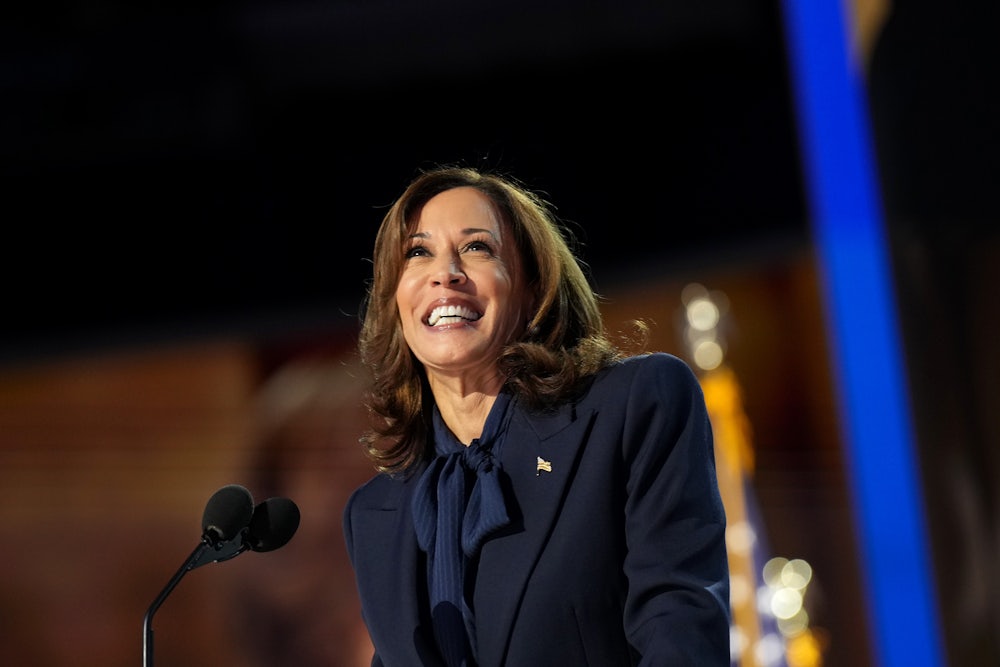Kamala Harris just showed us the promise of a post-MAGA future. Now it’s up to the voters to decide to take us there.
In her rousing convention speech on Thursday, Harris offered many olive branches to right-leaning independents and Republican voters. She vowed toughness on immigration and crime. She promised to transcend the nation’s divisions. She vowed to govern for all Americans and transcend faction or party. She made numerous appeals to voters with decidedly right-leaning values.
But, in mulling what Harris means by all this, it’s crucial to appreciate what she did not do. Harris offered all this outreach to voters outside the core Democratic coalition without making serious concessions to the ideological preoccupations we associate with MAGA-style right-wing populism. There was no real accommodation with what might be called The World According to MAGA.
Instead, Harris treated Trumpism and the MAGA movement as forces that must be decisively repudiated—and unequivocally left behind.
How could Harris appeal extensively to voters on the other side—which by definition includes tens of millions of people who voted for Donald Trump—while insisting on a firm national renunciation of many MAGA voters’ apparent aspirations and beliefs? This tension, I think, helps explain why her appeals came across as so richly complex.
Harris extensively reassured swing voters on many fronts. For those struggling economically, she offered populist, broadly appealing policies to curb health care and housing costs. To those preoccupied with crime and the border, Harris recounted her history as a tough prosecutor and vowed stringent border security. Harris delivered extensive paeans to middle-class struggles and values like family, community, homeownership, and faith. As William Kristol notes, she even strongly endorsed American exceptionalism.
Yet Harris was also absolutely unsparing in her takedown of Trump. And it’s important to appreciate this criticism for what it really was. In numerous ways, Harris portrayed the broad MAGA worldview as something in need of comprehensive repudiation.
A certain pundit theory of this election goes like this. The rise of Trump revealed an authentic upsurge of right populism in this country. In this telling, many voters do not see Trump’s violent insurrection as too dramatic a crime, because they’re skeptical of our institutions and don’t feel liberal democracy is delivering materially or spiritually. Many think Ukraine aid reflects a corrupted liberal international order and believe globalization has unraveled local attachments. Many oppose immigration on sincere communitarian or nationalist grounds. If some of this strays into illiberalism, well, that’s an understandable backlash to liberalism’s own excesses and failures.
In this view, these Trumpist orientations must be treated as deeply felt and important, and thus in some sense must be accommodated. That’s critical, under this theory, to any hopes for Democrats to win back blue-collar, rural, and aging white voters—and even working-class non-whites supposedly drifting toward right populism.
Notably, Harris’s speech made no such accommodations.
Harris, for instance, treated the insurrection as an unforgivable crime against the country—full stop. “Donald Trump tried to throw away your votes,” Harris said, making it absolutely clear that the day’s only victims were those who voted for Trump’s opponent. Harris sharply criticized Trump’s vow to pardon the “violent extremists who assaulted those law enforcement officers at the Capitol,” essentially declaring that leniency toward Trump supporters who attacked democracy is unthinkable.
There were no mealymouthed nods to the idea that the rioters were motivated by grievances with our institutions that maybe, just maybe had a kernel of quasi-legitimacy to them. Harris depicted Trump as an insurrectionist and a criminal—period. She did not shrink from describing all this—and Trump’s second-term plans to persecute the opposition—as a threat to the rule of law and the American experiment that is foundational and deserves zero tolerance.
Harris was similarly unequivocal in denouncing Trump over Ukraine. She hammered Trump for threatening to “abandon” NATO, which would give Russia a free hand to “do whatever the hell they want” to international allies, as Trump put it. She said this would “abdicate” our leadership role entirely.
Here again there was no concession to the idea that perhaps Trump and MAGA do kind of have a point about NATO. There’s nothing wrong with finding fault with the liberal order, of course. But the point is, Harris evinced zero tolerance for the Trumpist and MAGA populist position toward it, or for the dubious idea that this position is motivated by undercurrents of virtue.
Instead, Harris sharply noted that Trump is on the side of autocrats like Putin solely because “he wants to be an autocrat himself”—he aspires to run our country the way Putin and Viktor Orbán and their ilk run theirs, and for no other discernible reason. This requires unequivocal rejection.
On immigration, the story is admittedly more complicated. But Harris made no serious capitulation to Trumpism here, either. Harris did vow to sign the recently negotiated bipartisan border bill (the one that Trump ordered Republicans to kill), which would seriously restrict asylum-seeking, as MAGA populists do want.
But importantly, that bill would also somewhat expand legal immigration through new visas. What’s more, her speech expressly reaffirmed her commitment to legalization for undocumented immigrants in the United States. The Biden-Harris administration has already granted protections to half a million undocumented spouses of U.S. citizens and implemented parole programs allowing in tens of thousands of migrants monthly who apply from abroad. As president, Harris would restrict asylum-seeking—which may indeed be objectionable on humanitarian grounds—but she’d also seek to legalize millions, and those broader pathways for entry would be protected.
I do think Harris should more clearly outline her future vision of legal immigration and frontally condemn Trump’s explicit white nationalist attacks on immigrants. But still, Harris’s speech is at bottom a concession only to the idea that we must better manage immigration flows, and that we must shift incentives away from asylum-seeking toward broadening other legal means for immigrants to enter the country.
As would be expected from the daughter of immigrants—which her speech emotionally advertised—this vision just isn’t an ideological turn away from the ideal of encouraging legal immigration as an affirmative national good. It’s not a concession to Trumpist or MAGA populist anxiety over immigration in any meaningful sense.
So what is Harris really up to with all this?
It’s been argued that Harris is resuscitating an approach used by Barack Obama to make broad, unifying appeals to swing voters, employing what Semafor’s Benjy Sarlin describes as “patriotic pluralism.” Importantly, however, in Harris’s approach, this outreach appears to coexist with sharp, overt condemnation of the illiberalism being dangled before them in the form of Trumpism.
The force of the vision Harris outlined flows from this: She made genuine appeals to voters outside the Democratic coalition, including supporters of Trump—while simultaneously treating much of the MAGA right populist worldview as a toxically illiberal force in American life. This explains how Harris’s speech could be hailed by centrist commentators for recognizing the values of right-leaning populist voters, even as she also forcefully defended reproductive rights—and the “freedom to love who you love openly and with pride”—as fundamentally liberal freedoms.
This balance was also evident when Tim Walz, in his convention speech, rhapsodized about the communitarian virtues of small-town and rural life—while also full-throatedly standing up for the ideal of liberal autonomy. That’s what Walz did when he defended a woman’s right to choose as an act of “respect” for “our neighbors and the personal choices they make.” In this, Walz denounced the illiberal impulse to take those choices away as an act of supreme disrespect for those neighbors.
Barack Obama’s speech powerfully framed this election as a battle between liberal and the illiberal forces in American life, as Vox’s Zack Beauchamp argues. I’d add that Harris and Walz are defending the liberal impulse as an act of reciprocal social support. One big knock on liberalism is that its individualism has left people isolated and lacking in communal solidarity—and thus vulnerable to illiberal appeals like Trumpism. Harris and Walz seem to be saying that liberal reciprocity—standing up for the freedom and autonomy of others as an act of mutual respect—can create its own form of solidarity. You might call this “good vibes,” or “joy.”
In a remarkable turn, Harris appears prepared to run precisely the aggressive, inspired campaign that combatting the rising forces of domestic authoritarianism requires. Her vision hints at a post-MAGA future that is fully faithful to liberal ideals—freedom, autonomy, open societies, free and fair elections—while also addressing dissatisfactions with American life, from economic precarity to feelings of physical insecurity, that are leading many into the temptations of illiberalism. Getting to that future, Harris and Walz appear to be saying, will require fully consigning MAGA to the dustheap of history where it belongs.






